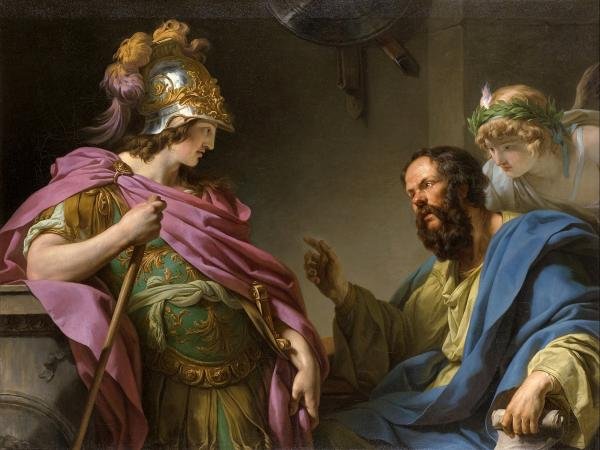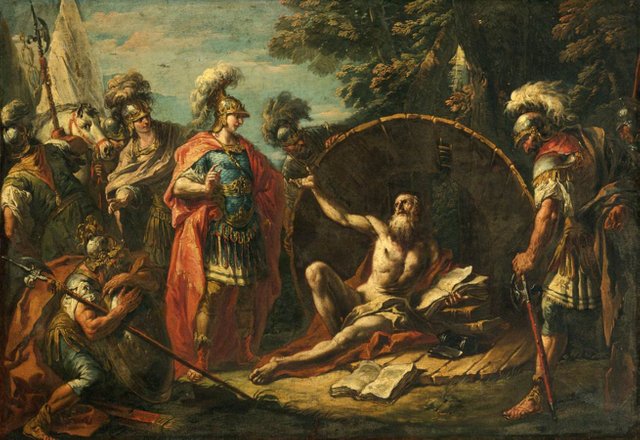Philosophy of Socrates ♛♥︎
Philosophy of Socrates:

Socrates cut an odd figure in Athens, walking about barefoot, long-haired, and unwashed in a society with very sophisticated ideals of beauty, despite many of Aristophanes' critiques seeming harsh. It didn't help that he was physically unattractive, with an upturned nose and bulging eyes, according to all accounts. Despite his intelligence and connections, he shied away from the glory and power that Athenians were expected to pursue. His way of living, and eventually his death, exemplified his attitude of questioning all assumptions about virtue, intelligence, and the ideal life.
The historian Xenophon and the philosopher Plato, two of his younger disciples, wrote the most important accounts of Socrates' life and thought. For both, the writer's mark can be seen on the Socrates who emerges. As a result, Xenophon's Socrates is more forthright, eager to give advise rather than simply ask more questions. Socrates speaks with what appear to be mostly Plato's views in Plato's later works. Socrates rarely expresses any personal opinions in the earliest of Plato's "Dialogues," which historians believe to be the most accurate portrayal, as he brilliantly assists his interlocutors in dissecting their thoughts and motives in Socratic dialogue, a form of literature in which two people converse. or more characters (in this case, one of them Socrates) discuss moral and philosophical issues, One of the most perplexing issues that Socrates helped his students grapple with was whether weakness of will (doing wrong while you know what's right) ever existed. He appeared to believe otherwise: people only make mistakes when the apparent benefits appear to outweigh the risks at the time. Thus, mastering what he called "the art of measurement," or rectifying the biases that skew one's calculations of value and cost, is necessary for the formation of personal ethics.
Trial and Death of Socrates:

Socrates was also very interested in figuring out what the boundaries of human knowledge were. Socrates was taken aback when he learned that the Oracle at Delphi had declared him the smartest man in Athens. He understood that, while he knew nothing, he was (unlike his fellow citizens) acutely aware of his own ignorance.
Socrates stayed out of politics when he could, and he had allies on both sides of the intense power struggles that followed the Peloponnesian War's end. His name was drawn to serve in the assembly of Athens, or ekklesia, in 406 B.C., one of the three branches of ancient Greek democracy known as demokratia. Socrates became the lone opponent of an unconstitutional plan to try a group of Athens' top generals for failing to collect their dead from a fight against Sparta (the generals were killed after Socrates' assembly duty ended). When a repressive Athenian government ordered Socrates to take part in the arrest and execution of Leon of Salamis three years later, he refused—an act of civic disobedience.
Although the tyrants were deposed before they could punish Socrates, he was accused in 399 for neglecting to worship the Athenian gods and corrupting the youth. Although some historians speculate that political manoeuvres may have played a role in the trial, he was found guilty based on his beliefs and teachings. Plato remembers Socrates launching a vigorous defense of his goodness before the jury yet calmly accepting their decision in "The Apology of Socrates." Socrates is said to have spoken the now-famous expression "the unexamined life is not worth living" in court.
Due to a religious festival, his death was postponed for 30 days, during which the philosopher's distressed friends tried unsuccessfully to persuade him to flee Athens. Plato claims he "looked both happy in attitude and words as he died nobly and without fear" on his last day. He drank the brewed hemlock his executioner offered him, walked around until his legs went numb, and then laid down, surrounded by his companions, waiting for the poison to reach his heart.
The Socratic Legacy:

Among the great philosophers, Socrates is the only one who is depicted and remembered as a quasi-saint or holy person. From the Skeptics to the Stoics to the Cynics, practically every school of ancient Greek and Roman philosophy wanted to claim him as one of their own (only the Epicurians ignored him, calling him "the Athenian fool"). Because all we know about his philosophy comes from other people's writings, the Socratic problem, or Socratic inquiry–reconstructing the philosopher's views in their entirety and examining any inconsistencies in second-hand accounts–remains an open question for scholars today.
Socrates and his disciples broadened the scope of philosophy from attempting to comprehend the external world to attempting to dissect one's own interior ideals. From Aristotle's time through the Renaissance and into the contemporary period, his love for definitions and perplexing questions influenced the development of formal logic and systematic ethics. Furthermore, Socrates' life became a model for the difficulty and significance of living (and, if necessary, dying) according to one's well-considered convictions. Benjamin Franklin simplified this concept to a single sentence in his 1791 autobiography: "Humility: Imitate Jesus and Socrates."